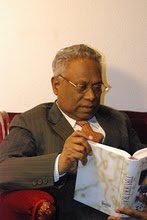"Motivation" (ஊக்கம் ) is the inner urge in the mind to achieve the aspired goals. We all have read the book of Vincent Norman Peale ,
'The Power of Positive thinking". It is printed in 41 languages and sold more than 20 million copies. The book says," Feeling of confidence depends upon the type of thoughts that habitually occupy our mind." Thoughts that occupy our mind determines our quality of life. Mind is always filled with positive and negative thoughts, the success in life depends upon the type of thoughts that fill in our minds. Our thoughts and motivations are the architect of our destiny.
Thiruvalluvar says in the Kural 593
Those who are with high motivation , even if they lose all their possessions, will never feel desperate.
ஆக்கம் இழந்தோம் என்று அல்லாவார் ஊக்கம்
ஒருவந்தம் கைத்து உடையார். ( 593 )
Motivation is a bundle of enthusiasm , zeal , will power , diligence , initiation , inspiration , self determination , etc which are the features of mind. If these are in mind , even if all the wealth is lost , nothing is lost. Such persons will emerge like phoenix birds by their will power and high motivation.
Kural 772 says- A person who went for hunting , killed many rabbits by using arrows, holds arrows in one hand and hunted rabbits in another hand and returns home. Another person who went for elephant hunting, after many efforts could not kill one, he returns with his failed spear in his hand. Thiruvalluvar says, the failed spear is worth holding than the successful arrows.
The spear that missed to kill an elephant is worth holding ( in the hand )
than the arrow that killed a hare ( rabbit ).
கான முயல் எய்த அம்பினில் யானை
பிழைத்த வேல் ஏந்தல் இனிது (772)
Jemsetji Tata started Asia's first and India's largest Iron and Steel industry , Taj Mahal Hotel, Electricity generating plant, etc, all were elephant hunting. He never went for rabbit hunting . To-day TATA sectors are the largest private sectors in India.
For highly motivated people losing is the first step to win. It should not be forgotten that great failures are the high motivations.
This is what Thiruvalluvar says, a failed attempt on an elephant is much better than a successful attempt on a hare. Any failure is the stepping stone to success. A person should not stop at a failure, he should remove the causes of the failure and try again and again till the success is achieved.
Alfred Nobel was experimenting on developing Nitroglycerine as a safe explosive. In 1864 there was a major explosion in his factory which killed his brother Emil and a few others. The Government authorities asked him to close the factory.
Anybody would have been discouraged and dropped the project, but Alfred Nobel through his self motivation determined to continue. He considered the failure as the first step to success.He hired an anchored small ship in the lake Malaren and continued his efforts, developed safe detonators, made huge money in the business, instituted NOBEL PRIZE, which is the greatest prize of the world to-day.
To excel in a business, high motivation should be developed. In organisations, the manager should keep his team always highly motivated to reach the goals. 'Start moving' and 'Stand moving' both need motivation, only when there is a start , there will be a move.
In the kural 596 Thiruvalluvar talks about high objectives -
The objectives and aims should always be fixed high,
Even if not achieved, those thoughts should not be changed. (596)
உள்ளுவது எல்லாம் உயர்யு உள்ளல் மற்றது
தள்ளினும் தள்ளாமை நீர்த்து.
Alfred Nobel did not change his objectives when his brother was killed .
His high objective of developing safe detonator was finally succeeded.
.
Any motivation is governed by mind sets, to some students any attempt of motivation to learn mathematics go in vain, but every student wants to learn motorbike riding or computer operating. Why ? it is the mind set, it is the driving force in the inner mind to learn certain interesting subjects.
Those who want to motivate others , should know their mind sets and then decide the approach to be adopted.
Self motivation ( intrinsic ) is very important for those who hold high ranks, in critical time , they have to motivate themselves through auto- suggestions and solve the issues.
External motivation ( extrinsic ) also will be helpful in certain cases, applying right motivational techniques will fetch good results.
In the Corporate companies, status, job security, remuneration, recognition, perks etc give high motivation to the employees. Absent of these factors will lead to total demotivation. In fact good motivation will lead to higher morale of the employees
Prof Stephen Hawking suffering from motor neuron disease is wheel chair bound with a very limited physical power, but authored the top seller book, ' A brief history of Time " .His will power and high motivation had made it possible.
Deaf and blind Helen Keller became a successful author, lecturer and a political activist in US by her extremely high motivation.
A mind without any motivation will never take any one to any height . If the motivations are high, the achievements will also be high. A small pond of three feet dirty water can not bloom a lotus having thirty feet stem, the stem will grow only till the surface of water. Similarly, to achieve a higher level of success, the motivation level should also be high.
This is explained in the kural 595.
The stalk (stem) of a lotus plant grows upto the water height,
The achievement of a man goes upto his mind's height. (595 )
mind's height = level of motivation
வெள்ளத்து அனைய மலர் நீட்டம் மாந்தர்தம்

